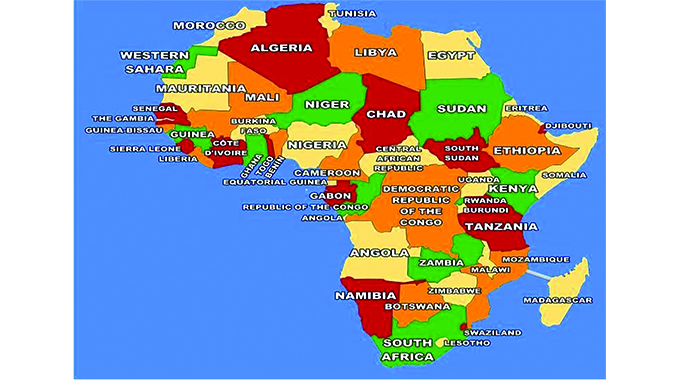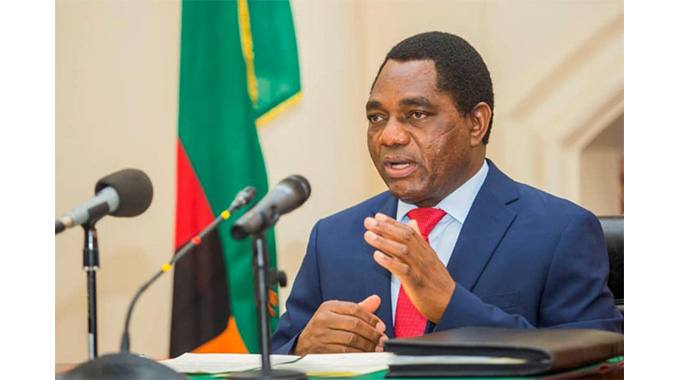
The Sunday News

Leonard Ncube, Victoria Falls Reporter
Last month, Zimbabwe hosted the 6th Transform Africa Summit (TAS) in Victoria Falls with five Heads of State, 44 ministers and 4 000 delegates drawn from 96 countries.
A record eight Memoranda of Understanding were signed between Smart Africa Alliance, the organisation that organises TAS, and various other partners.

President Mnangagwa, the Head of State and Government
The MoUs signed with the Internet Society and European Union have a direct impact on Zimbabwe through localised projects.
Zimbabwe became the first country to host the TAS outside Rwanda which hosted the five previous editions.

Rwanda President Paul Kagame, who chairs the Smart Africa Alliance board, was joined by host President Mnangagwa, Zambian President Hakainde Hichilema, Malawian President Lazarus Chakwera and His Royal Majesty, King Mswati of Eswatini for a historic official opening which they all addressed.
It was a record attendance by five Heads of State for the organisation as the TAS seed was planted 10 years ago by seven Heads of State.
The organisation has grown to 36 countries affecting more than 1 billion people in all countries, while Botswana and Gabon are set to join soon.

President Hichilema
The biggest message that came out of the conference was the need for Africa to be united in an effort to promote the Africa we want as espoused in the Agenda 2063.
The country next week joins the rest of the continent to mark Africa Day with the 60th anniversary being celebrated under the slogan, “Our Africa Our Future”, using the hashtag #OurAfricaOurFuture.
Africa Day commemorates the establishment of the Organisation of African Unity (OAU) now the African Union (AU) on 25 May 1963 in recognition of the vision and milestone achieved towards “An Integrated, Prosperous and Peaceful Africa, driven by its own citizens and representing a dynamic force in the global arena.”

Lazarus-Chakwera
This, in remembrance of its founding members, whose dream was to strive for a united Africa, at peace with itself, and representing a dynamic force in the world arena and more especially, the fight against colonialism. Eventually, most African countries achieved independence in the 1950s through the 1960s and later in the 1990s with the fight against apartheid.
Activities to mark the historical moment will be commemorated all over the African continent by the 55 member countries of the African Union.
All AU Member States are expected among other things, to showcase major successes, milestones, challenges, and way forward under Agenda 2063.
Agenda 2063 dovetails with the Second Republic’s Vision 2030 which strives for an upper middle-income society where everyone and every place is not left behind in the economic transformation agenda.

King Mswati III
Vision 2030 is being implemented through the economic blueprint, National Development Strategy 1. Technology can unite the continent, especially through facilitating trade and mobile money transactions, helping diaspora based citizens to remit money home.
The Block Smart Africa approach, target areas for TAS, identifies mechanisms to bridge the digital gap and create a technology union as countries work with the Pan African vision.
Africa’s digital economy is large and fast-growing hence the need for all countries, Zimbabwe included, to invest heavily in digital technology with a vision to transform Africa into a single market.
Zimbabwe and other countries can benefit through improved trade at a time when intra Africa trade is low as member states hardly trade between each other.
Africa needs huge cross-border interaction and movement for improved investment.
The target is to have a connected Africa by 2030 and the continent needs about US$100 billion investment into digitalisation to build connectivity, affordability and capacity and governments have to play a critical role in that. By hosting TAS, Zimbabwe, in line with the mantra, “Zimbabwe is Open for Business”, opened up to more investments with the International Telecommunications Union intensifying footprint in capacitating schools.
Working with the Postal and Regulatory Authority of Zimbabwe and Government, ITU established a computer laboratory with 30 computers at Ndlovu Secondary School outside Victoria Falls, to become the first rural school in the area to have a state-of-the-art computer room.
The Smart Africa vision is to have connected Africa by 2030 to have a single digital market.
Smart Africa has called for collaboration from member states to achieve the vision, according to Smart Africa Alliance chief executive Mr Lacina Kone, who noted that Africa has a young population that needs to be supported by start-ups.
The Second Republic has put emphasis on Government partnerships with the private sector to help drive the economic and industrial transformation agenda towards achieving the upper middle income society vision by 2030. Zimbabwe has intensified digital transformation through Education 5.0, innovation and start-ups where the private sector has a big role to play.
ICT, Postal and Courier Services Deputy Minister Dingumuzi Phuti said collaboration is key while the need to empower women in ICT should be prioritised.
He said Zimbabwe can “use ICT to lower rates of corruption, improve revenue collections and employment.” He said the country is set to benefit from partners that are willing to invest in Zimbabwe.
A Ministers’ Roundtable was held as part of the main proceedings and coincided with the commemoration of the girls in ICT in Education where Primary and Secondary Education Minister Dr Eveline Ndlovu was joined by several other African Ministers.
Dr Ndlovu said the TAS rubberstamped the country’s national gender policy which facilitates gender mainstreaming in all institutions as gender was a key focus area.
Through the help of various partners and funders, Government is establishing smart classrooms and computer laboratories in rural areas.
“Let’s renew our commitment to empowering girls through education and ensuring that they have equal opportunities to succeed in the digital age. Let us also watch out for spaces where the boy child might be lagging and plug those for a holistic development of our young people,” she said.
President Mnangagwa said the TAS had opened the eyes of Africans to move away from neo-colonial bondage and leapfrog the continent. He said Africa has potential to surpass western civilisation.
“Collectively let us leverage technology to achieve Agenda 2063. The country can leverage on technological developments to enhance e-government services and bring services closer to the people,” said President Mnangagwa.
He said Zimbabwe has made tremendous progress in capacitating young people with digital skills through innovation hubs and other initiatives, smart agriculture, and other strategies.
President Kagame said African member states should “move quickly to embrace Artificial Intelligence and fight cyber security, enhance continental integration, trade and cooperation.”
President Hichilema said the Transform Africa Summit is an important platform for the continent which should set its ambitions high towards achieving Agenda 2063 and the Africa we want.
He said the rate at which technology is advancing is tremendous and Africa should not be left behind.
“The biggest population is youth and the future generation. Let’s take care of the young ones, they will take care of us and our continent when we grow old. We cannot avoid digitalisation in our households, in our communities, in our businesses and in our economies, so we must invest in technology,” he said.
King Mswati (III) said now is the time for African states to focus on technology development as a vehicle that enhances development of ordinary citizens.
“A United Africa can create a more stable and secure environment that encourages investment, job creation and economic growth. In recent years, technology has enabled people to communicate and collaborate across borders,” said the King.
President Chakwera said Africa’s future lies in working hard.
“We are going to rise as a continent and leapfrog. We must rise through technology,” he said.
Zimbabwe is championing agriculture in Africa. From the MoUs that were signed, rural areas will be connected to the internet thereby becoming part of the transformative global village where services can be accessed online.



